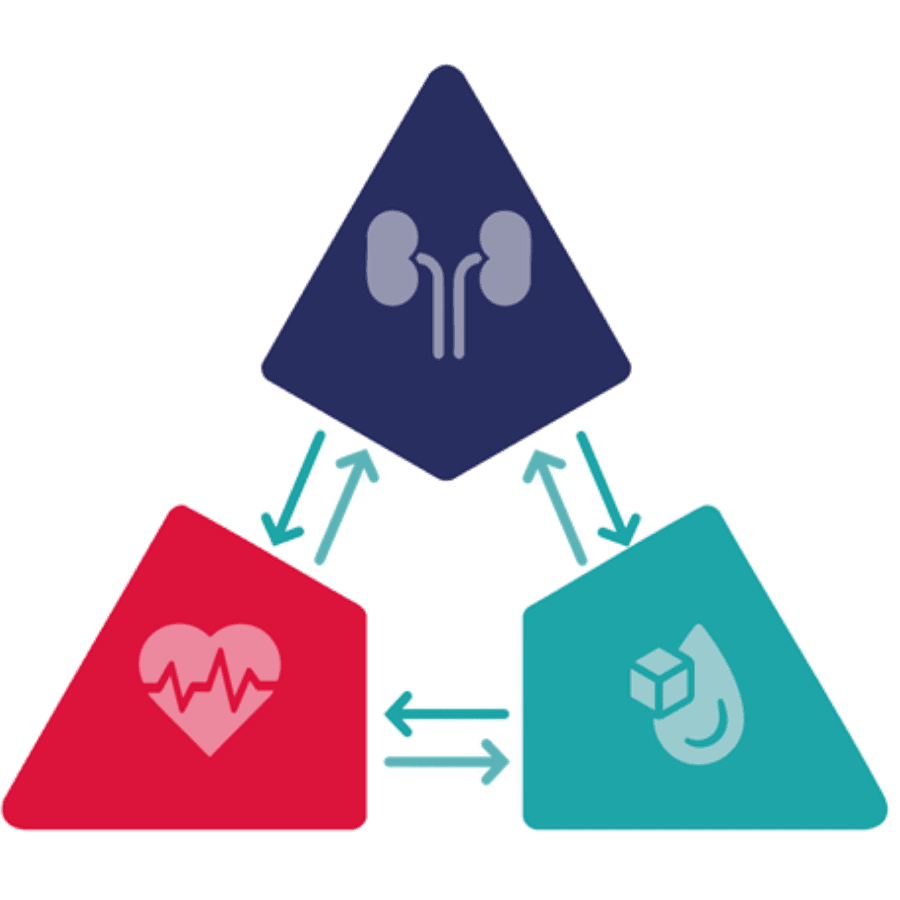
What is Cardiovascular-Kidney Metabolic Syndrome?
Cardiovascular-Kidney-Metabolic Syndrome (CKM) is also called Cardio-Renal-Metabolic Syndrome (CRM). CKM happens when your heart and kidneys are not working well, and you have other conditions such as diabetes, obesity, and high blood pressure.
CKM Basics
Test for Angina
Three Conditions Interact to Affect Your Health
Kidney Conditions
- Chronic kidney disease
Heart Conditions
- Heart attack
- Stroke
- Atrial fibrillation
- Peripheral artery disease
- Heart failure
Metabolic Conditions
- Diabetes
- Obesity
- High blood pressure
- High triglycerides

Signs and Symptoms
Let your healthcare team know if you have any of the following symptoms of CKM:
- Chest pain
- Swelling
- Shortness of Breath
- Passing out
- Leg pain while walking
- Feeling tired
- Fast or slow heartbeat
- Pale skin
- Needing to pee more or less than normal
- Weight gain
- Feeling more or less hungry than normal
Risk Factors
Talk with your healthcare team to see what these or other risk factors might mean for you.
- Smoking or vaping
- Older age
- Family history of diabetes or kidney failure
- Physical inactivity
- Unhealthy diet
- Sleep conditions
- Mental health concerns
- Chronic inflammation
- Early menopause
Learn More
Explore these topics further to learn more about angina.
Before and After the Hospital

Before You Leave the Hospital
It is important to understand what to do to keep yourself healthy. Before you leave the hospital, make sure to understand the instructions you are given and ask any questions. You may want to have a family member or trusted friend help you understand what you need to do to stay healthy.
- Know what medicines you are taking, and how to take them
- Know your plan for healthy eating
- Understand how to exercise and move safely
- Ask the hospital team for help with transportation, meal delivery, or with the costs of your medicine
After You Leave the Hospital
Know what your daily numbers should be, and track them every day.
- Blood pressure
- Blood sugar (glucose)
- Weight
- Keep a list of emergency contacts and medications.
- Act fast if you are having problems breathing, have chest pain, or have new symptoms.
- Have your blood work checked regularly as instructed by your care team.
- Contact your healthcare team if you have any questions or concerns.
- Keep a list of questions to ask at your next healthcare visit.
- Ask for support from a family member or caregiver if you need help understanding your diagnosis or care, or if you need help with tasks or getting to your clinic visits.
Be Your Own Advocate
While you can’t control your diagnosis, you can control your health. Work with your healthcare team to create a plan to keep your CKM under control.
- Develop a plan for healthy eating.
- Make time to move! Aim for 150 minutes of physical activity per week. Even small amounts of time will add up!
- Create a system to keep track of your health records and upcoming appointments.
- Avoid using tobacco products and exposure to second-hand smoke.
- Avoid alcohol use. Drinking alcohol can be harmful to your kidneys and can raise blood pressure.
Resources
Access resources for PCNA and other organizations that can help you manage your symptoms and reduce your risk for more problems.
Disclaimer: While PCNA strives to provide reliable, up-to-date health information, this and other PCNA education materials are for informational purposes only and not intended as a substitute for professional medical care. Only your healthcare provider can diagnose and treat a medical problem.
Learn More
Explore these topics further to learn more about angina.





